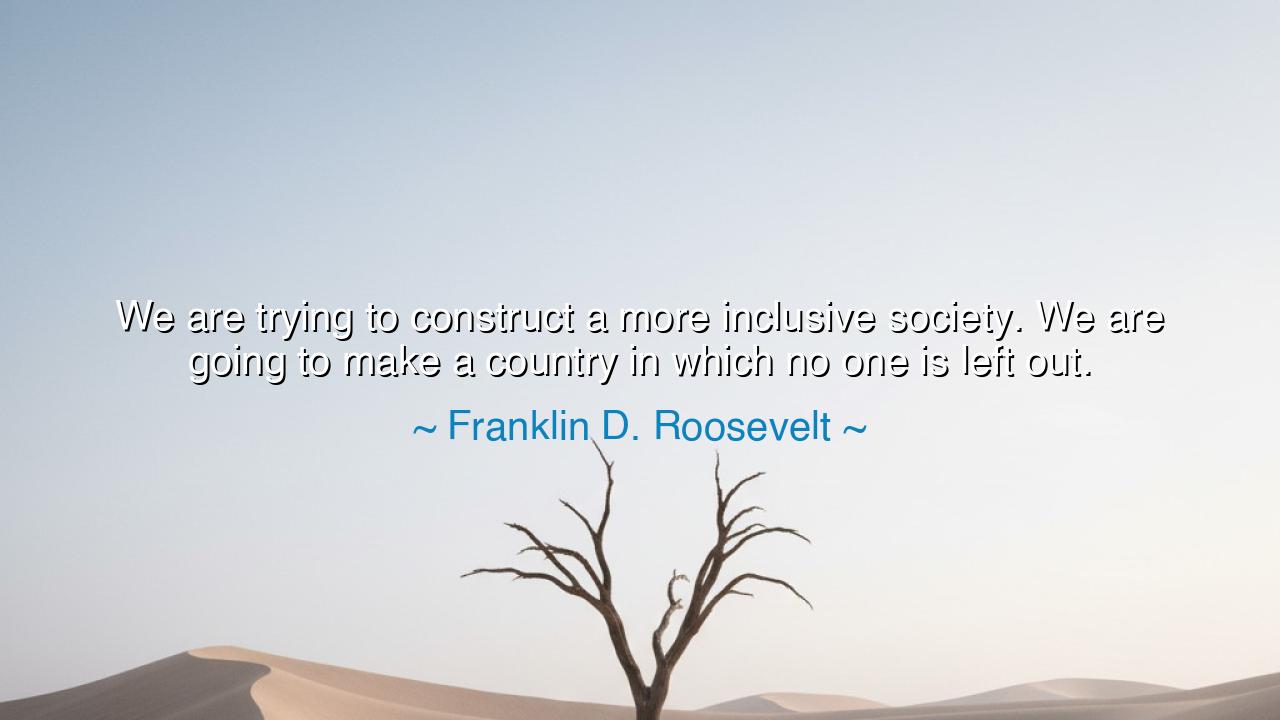
We are trying to construct a more inclusive society. We are going
We are trying to construct a more inclusive society. We are going to make a country in which no one is left out.






Hear, O child of tomorrow, the noble words of Franklin Delano Roosevelt: “We are trying to construct a more inclusive society. We are going to make a country in which no one is left out.” These words were spoken in an age of trial, when the earth shook under the weight of economic despair and the storms of war. Yet in the midst of fear and division, Roosevelt cast his vision not only upon survival, but upon renewal. He dreamed of a nation built not for the few, but for the many; not for the privileged, but for all who called it home.
To say “inclusive society” is to declare a revolution of spirit. For through the centuries, nations have too often been built on the exclusion of the weak, the silencing of the poor, the neglect of the marginalized. But Roosevelt, carrying the burdens of his people through the Great Depression, saw that true strength could not rest upon the shoulders of the few. Only by lifting all together could the nation endure. In this lay the heart of his New Deal: a promise that the outcast, the hungry, the unemployed, and the forgotten would not be abandoned to despair.
Consider the years of the Great Depression, when breadlines stretched across city streets and families shivered in homes without heat. Factories lay silent, and men and women who had once labored proudly now stood idle, stripped of dignity. In such an hour, it would have been easy for leaders to say, “Save the strong, and let the weak perish.” Yet Roosevelt chose the harder path. Through programs of relief, reform, and public works, he sought to weave every citizen into the fabric of recovery. He said to the nation: no one shall be left out.
And this vision did not end with economics. When the fires of the Second World War engulfed the globe, Roosevelt spoke again of a world where freedom would belong to all peoples, not just the victors. In his famous “Four Freedoms” speech, he proclaimed freedom of speech, freedom of worship, freedom from want, and freedom from fear as the rights of every human soul. His dream of inclusivity stretched beyond America’s borders, reaching toward a future where the dignity of all men and women would be honored.
Yet let us not be deceived: to build an inclusive society is no easy task. Resistance rises like a shadow against it. Prejudice, greed, and fear ever seek to divide. Even in Roosevelt’s time, not all were included—racial injustice lingered, and many voices remained unheard. But his words call us not to complacency but to labor. They remind us that the work of inclusion is never finished; it is the lifelong task of every generation to widen the circle, to extend the hand, to break down the barriers that cast others out.
The lesson is clear: a society that abandons some of its people will, in the end, abandon itself. The chain is only as strong as its weakest link; the nation only as enduring as its most vulnerable citizen. To live by Roosevelt’s wisdom is to measure progress not by the riches of the powerful, but by the dignity of the least among us.
So I say to you, O listener: if you would build a nation worthy of honor, take up this charge. Seek out the excluded, defend the forgotten, raise up the voiceless. In your work, in your community, in your daily life, make room for all. For when no one is left out, when the circle of belonging encompasses every soul, then truly shall society be strong, radiant, and unshakable across the ages.






AAdministratorAdministrator
Welcome, honored guests. Please leave a comment, we will respond soon